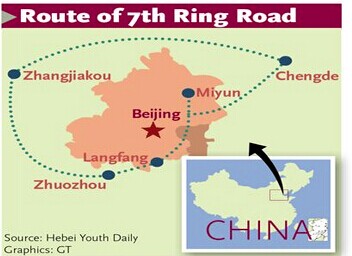

Beijing's 7th Ring to unify mega-region
Beijing has announced that plans have been finalized for the Seventh Ring Road, a 940-kilometer highway to connect the capital with neighboring Hebei Province, as part of the master plan for the Beijing-Tianjin-Hebei metropolitan area.
While economists have said that this will aid integration of the region, environmentalists question the effect it will have on pollution.
The expressway, which will encircle Beijing and run through Langfang, Zhuozhou, Zhangjiakou and Chengde, is designed to help alleviate the capital's traffic pressure.
It will also facilitate industrial relocation between Beijing and Hebei, as well as connect Beijing with the rest of China, Gao Jinhao, director of Hebei's Transport Department said Wednesday during an interview with the Ministry of Transport's website.
Previous reports indicated the road will be open at the end of 2015.
Gao also pledged to speed up construction of a railway linking downtown Beijing with the suburb of Yanjiao and a high-speed railway between Beijing and Shenyang, Liaoning Province. New airports will also be built in Beijing and Hebei's Shijiazhuang.
Economists describe the highway as a step to realize the Beijing-Tianjin-Hebei mega-plan.
"Beijing started talking about the possibility [of integration] about five years ago," Gilbert Van Kerckhove, a Beijing-based economic planning consultant, told the Global Times. "So it's a natural and logical step."
Van Kerckhove believes the three interlinked regions will complement each other in terms of their industrial division. While Hebei will take over heavy industries, Tianjin will focus on electronics and telecommunication, and Beijing will continue to develop finance, banking, service and high-tech industries.
The Beijing-Tianjin-Hebei integration will give an extra edge to the region in catching up with the thriving Pearl River Delta Region, noted Van Kerckhove. However, different regions are not in mutually exclusive competition because each region has its own advantages.
Other experts displayed worries about the feasibility of the integration, even with the help of a highway.
"Corporations in Beijing may not be willing to move to Hebei and Tianjin, as they may lose the economic advantage they enjoy in Beijing," Zhang Hanya, a research fellow at the National Development and Reform Commission, told the Global Times.
The project also draws speculation over its effectiveness in alleviating pollution and transportation issues.
"Building the Ring Road will not solve congestion and air pollution, but will only worsen the existing problem," said He Dongquan, board member of China Sustainable Transportation Center.
He said Beijing's overpopulation problem will continue to plague the city as people from other provinces will still flood to Beijing, and the highway may create even bigger congestion because of likely urban sprawl.
"The Fourth and Fifth Ring Roads were supposed to ease congestion, but they have in fact attracted more traffic," noted He, suggesting that the government should change its focus from road-building to construction of more sustainable railways.
Beijing’s 7th ring road to reach Tianjin, Hebei
2014-06-26Beijing outer expressway ring to complete by 2016
2014-05-03Government looks to enhance Beijing-Hebei-Tianjin integration
2014-05-29Blueprint coming for coordinated infrastructure of Beijing, Tianjin, Hebei
2014-05-29Beijing to connect its subway lines to Hebei
2014-05-23Copyright ©1999-2018
Chinanews.com. All rights reserved.
Reproduction in whole or in part without permission is prohibited.